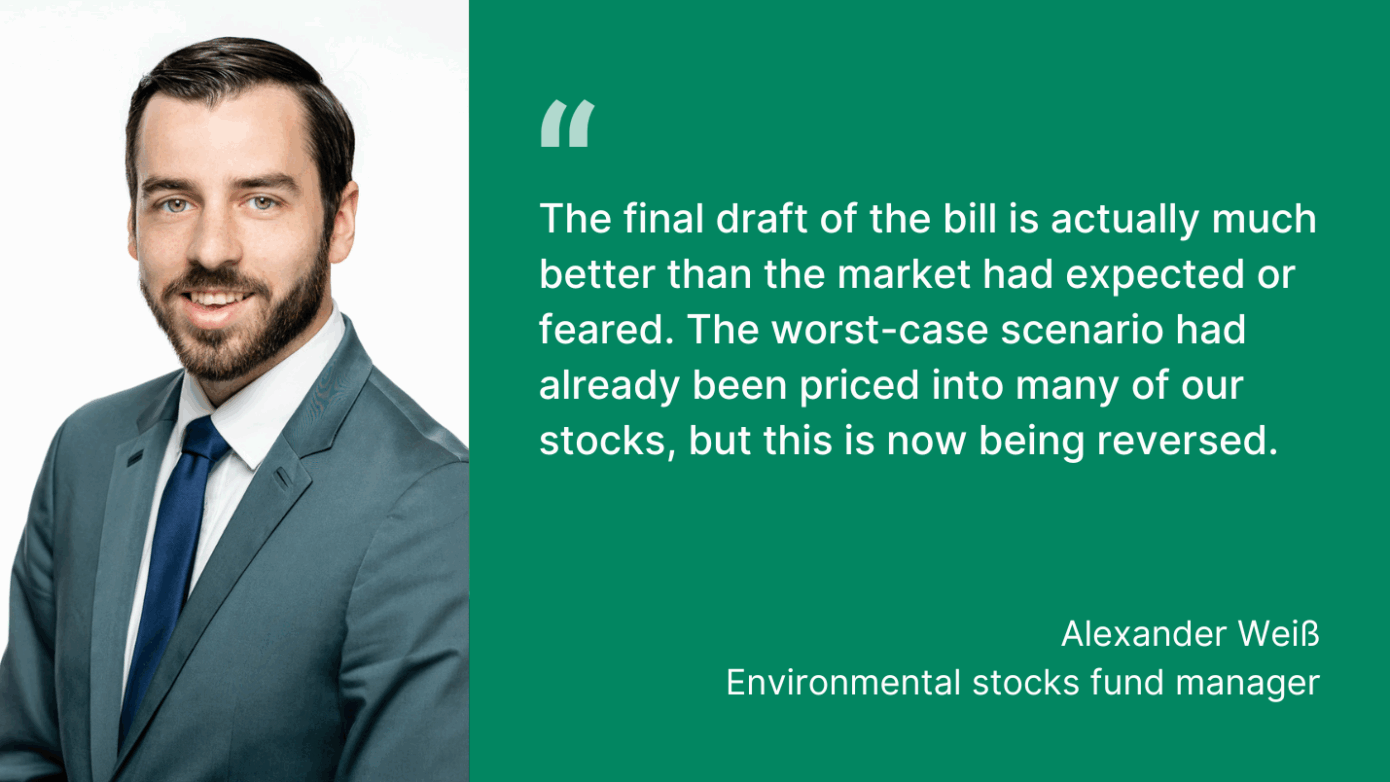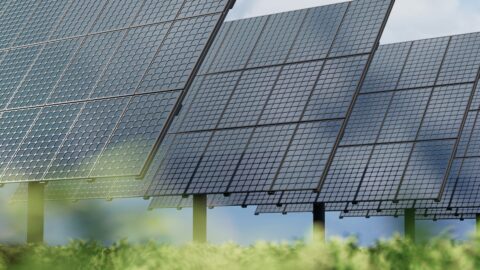The recently published US draft budget contains, among other things, interesting passages on the future of the Inflation Reduction Act and the associated subsidies for renewable energies. In an interview, environmental equity fund manager Alexander Weiss explains what the draft means for investors and why the market reacted positively to it.
Erste AM Communications: The US Congress has recently presented its draft budget for 2025. What does this mean for renewable energies?
Alexander Weiss: The draft introduces a number of important changes, particularly with regard to the tax incentives introduced under the Inflation Reduction Act (IRA). The good news is that the key tax breaks, namely the Investment Tax Credit (ITC) and the Production Tax Credit (PTC), will remain in place in their entirety until the end of 2028. They will then be phased out gradually by 2032.
This sounds like a bit more planning security – how will this affect companies?
Planning security is certainly very important. Uncertainty is poison for the equity market, as has recently manifested itself in the prices of cleantech shares; but now there is more visibility. The gradual phasing-out from 2028 means that the current subsidies will remain in place until then. With the mid-term elections looming on the horizon in 2026 and the presidential elections in 2028, there is a chance that the political landscape in the USA will shift back towards the Democratic Party, which is known for its significantly more positive stance on renewable energies.
We have always taken the view that the changes to the IRA will be less dramatic than expected by the market, as the subsidies mainly benefit Republican states (👉 as also described in this blog article).
The current draft bill is actually much better than the market had expected or, indeed, feared. The worst-case scenario had already been priced into many of our shares, but this is now being reversed. Some of the shares in the ERSTE WWF STOCK ENVIRONMENT and ERSTE GREEN INVEST funds doubled in value within a month. However, we should like to point out that the current proposal is only a starting point for negotiations. The market expected the first draft bill to be as negative as possible, with negotiations then leading to something more realistic. The fact that we are starting with such a constructive proposal is very positive for almost all companies in the cleantech universe.
Note: Please note that investing in securities involves risks as well as opportunities.
Let’s go into a little more detail about which subsidies will remain and what will happen to the so-called bonus adders – i.e. additional subsidies for certain projects?
As mentioned earlier, the ITC and PTC – which represent 30% subsidies for renewable energy projects such as wind and solar – remain in place. Fortunately, the bonus adders also remain untouched. This applies, for example, to projects with a high US share in the value chain (“domestic content”), in structurally weak regions (“energy communities”) or for households with low to medium incomes. This is an important signal, especially for providers in the residential solar sector such as Sunrun, as a large part of their cash flows are based on these bonus schemes. Sunrun remains one of our top picks.
Note: The companies mentioned in this article have been selected as examples and do not constitute investment recommendations.

And what’s the situation with private homeowners?
Here we can see a clear break: the tax credit for private homeowners is set to expire after 2025. This means that individuals will no longer receive direct tax breaks in the future. The winners in this development are providers of leasing models such as Sunrun, who can continue to use the investment tax credits for themselves as commercial owners.
Domestic production is another topic – what is going to change here?
Subsidies for domestic production will remain in place until 2031, with a complete phasing-out by 2032. For wind power, subsidies will end as early as 2027. New additions include so-called “Foreign Entity of Concern” (FEOC) clauses: two years after they come into force, components from certain foreign sources – such as China – will be excluded. This strengthens US manufacturers such as First Solar, which already rely heavily on local production. The FEOC clauses are essentially aimed at weakening China, with the intention of bringing supply chains and value creation back to the USA.
Are there any implications for other technologies at all such as hydrogen or nuclear power?
Yes, and we are critical about the draft particularly when it comes to green hydrogen. Although subsidies for domestic production will formally remain in place, stringent restrictions will be introduced: two years after the bill comes into effect, no components may come from the aforementioned Foreign Entities of Concern (FEOC) anymore, i.e. from China. This is problematic because many electrolysers and components for hydrogen projects are currently still heavily dependent on Chinese supply chains. This creates a double gap: on the one hand, funding remains in place but is subject to conditions that many projects will not be able to meet in the short term. On the other hand, there is a lack of clear transitional arrangements or targeted incentives for the development of alternative supply chains. This could lead to planned hydrogen projects being postponed or cancelled altogether.
And what about nuclear energy – especially Small Modular Reactors?
Small Modular Reactors (SMRs) are increasingly being touted as the solution to all our energy problems; we at Erste Asset Management have tended to be somewhat more critical in this respect, because the timelines and duration of development for these reactors are longer than is often assumed by the public. We would also regard the current draft legislation as coming out on the negative side for SMRs. The tax credit for nuclear energy, which is also relevant for SMRs, follows the same phasing-out path as ITC and PTC: full funding until 2028, then gradual reduction until 2032. This is a problem because many SMR projects are not expected to see implementation before the early 2030s. The subsidy could therefore expire before the technology is market-ready – a clear setback for investors in this segment.
Your conclusion about the draft budget?
The draft budget is positive across the board for clean tech shares. Attractive subsidies will remain in place until 2028, even if the conditions will become somewhat more complex. For investors, this means becoming more selective and keeping an eye on supply chains. The political risk that had dampened sentiment is now gone – we can finally focus again on the fundamentals, which remain much more favourable than the overall market. The energy transition remains a growth area – but one with new rules.
Risk notes ERSTE WWF STOCK ENVIRONMENT
Please note that investing in securities also involves risks besides the opportunities described.
The fund employs an active investment policy and is not oriented towards a benchmark. The assets are selected on a discretionary basis and the scope of discretion of the management company is not limited.
For further information on the sustainable focus of ERSTE WWF STOCK ENVIRONMENT as well as on the disclosures in accordance with the Disclosure Regulation (Regulation (EU) 2019/2088) and the Taxonomy Regulation (Regulation (EU) 2020/852), please refer to the current Prospectus, section 12 and the Annex “Sustainability Principles”. In deciding to invest in ERSTE WWF STOCK ENVIRONMENT, consideration should be given to any characteristics or objectives of the ERSTE WWF STOCK ENVIRONMENT as described in the Fund Documents.
Risk notes ERSTE GREEN INVEST
Please note that investing in securities also involves risks besides the opportunities described.
The fund employs an active investment policy and is not oriented towards a benchmark. The assets are selected on a discretionary basis and the scope of discretion of the management company is not limited.
For further information on the sustainable focus of ERSTE GREEN INVEST as well as on the disclosures in accordance with the Disclosure Regulation (Regulation (EU) 2019/2088) and the Taxonomy Regulation (Regulation (EU) 2020/852), please refer to the current Prospectus, section 12 and the Annex “Sustainability Principles”. In deciding to invest in ERSTE GREEN INVEST, consideration should be given to any characteristics or objectives of the ERSTE GREEN INVEST as described in the Fund Documents.
Legal disclaimer
This document is an advertisement. Unless indicated otherwise, source: Erste Asset Management GmbH. The language of communication of the sales offices is German and the languages of communication of the Management Company also include English.
The prospectus for UCITS funds (including any amendments) is prepared and published in accordance with the provisions of the InvFG 2011 as amended. Information for Investors pursuant to § 21 AIFMG is prepared for the alternative investment funds (AIF) administered by Erste Asset Management GmbH pursuant to the provisions of the AIFMG in conjunction with the InvFG 2011.
The currently valid versions of the prospectus, the Information for Investors pursuant to § 21 AIFMG, and the key information document can be found on the website www.erste-am.com under “Mandatory publications” and can be obtained free of charge by interested investors at the offices of the Management Company and at the offices of the depositary bank. The exact date of the most recent publication of the prospectus, the languages in which the fund prospectus or the Information for Investors pursuant to Art 21 AIFMG and the key information document are available, and any other locations where the documents can be obtained are indicated on the website www.erste-am.com. A summary of the investor rights is available in German and English on the website www.erste-am.com/investor-rights and can also be obtained from the Management Company.
The Management Company can decide to suspend the provisions it has taken for the sale of unit certificates in other countries in accordance with the regulatory requirements.
Note: You are about to purchase a product that may be difficult to understand. We recommend that you read the indicated fund documents before making an investment decision. In addition to the locations listed above, you can obtain these documents free of charge at the offices of the referring Sparkassen bank and the offices of Erste Bank der oesterreichischen Sparkassen AG. You can also access these documents electronically at www.erste-am.com.
Our analyses and conclusions are general in nature and do not take into account the individual characteristics of our investors in terms of earnings, taxation, experience and knowledge, investment objective, financial position, capacity for loss, and risk tolerance. Past performance is not a reliable indicator of the future performance of a fund.
Please note: Investments in securities entail risks in addition to the opportunities presented here. The value of units and their earnings can rise and fall. Changes in exchange rates can also have a positive or negative effect on the value of an investment. For this reason, you may receive less than your originally invested amount when you redeem your units. Persons who are interested in purchasing units in investment funds are advised to read the current fund prospectus(es) and the Information for Investors pursuant to § 21 AIFMG, especially the risk notices they contain, before making an investment decision. If the fund currency is different than the investor’s home currency, changes in the relevant exchange rate can positively or negatively influence the value of the investment and the amount of the costs associated with the fund in the home currency.
We are not permitted to directly or indirectly offer, sell, transfer, or deliver this financial product to natural or legal persons whose place of residence or domicile is located in a country where this is legally prohibited. In this case, we may not provide any product information, either.
Please consult the corresponding information in the fund prospectus and the Information for Investors pursuant to § 21 AIFMG for restrictions on the sale of the fund to American or Russian citizens.
It is expressly noted that this communication does not provide any investment recommendations, but only expresses our current market assessment. Thus, this communication is not a substitute for investment advice.
This document does not represent a sales activity of the Management Company and therefore may not be construed as an offer for the purchase or sale of financial or investment instruments.
Erste Asset Management GmbH is affiliated with the Erste Bank and austrian Sparkassen banks.
Please also read the “Information about us and our securities services” published by your bank.

